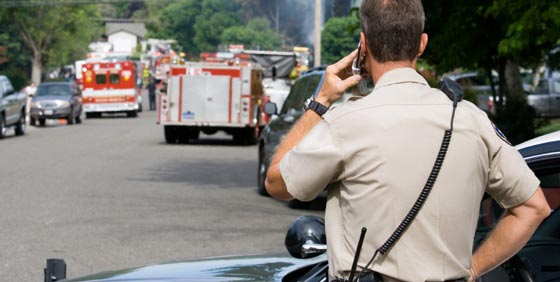November 19, 2018

In the wake of Verizon’s Cal Fire throttling scandal during last year’s deadly Mendocino Complex fires, AT&T and FirstNet have risen as the white knight for first responder cellular services. Launched in March of 2018, FirstNet is a congressionally-funded standalone network dedicated to prioritizing and protecting first responders. AT&T, the sole FirstNet partner under a new 25 year contract, has begun intense marketing as it enrolls paramedics, firefighters, and law enforcement onto the new service.
However, the FirstNet rollout is not without issue, and AT&T, under apparent pressure to meet enrollment targets through its contract, has continued deploying the service zealously. Many first responders are reporting a lack of transparency regarding ongoing issues such as hardware, network services, and savings.
FirstNet was created after the 9/11 Commission noted technology hindered first responders during the attack and subsequent disaster management. The commission recommended increased radio spectrum for public safety to allow for better interoperability and new technology to enhance disaster response. In 2012, congress acted and authorized the FCC to implement the new network.
FirstNet offers brutal preemption for first responders, meaning first responders get first access to available radio towers and can boot other users to make room during congestion. It categorizes users into three service blocks– A primary block of first responders (paramedics, police and fire) a secondary block of delayed responders (e.g. nurses, physician, infrastructure) and a third block of regular users.
To gain access to the first block, enrollees must receive a special FirstNet sim card. And yet curiously, many FirstNet enrollees are reporting they are not being given these cards. In our discussion with AT&T, a company representative stated that users without the FirstNet-specific sim card would end up in the second block, getting priority over regular users but not first priority as advertised. A southern California retailer we spoke with stated they have been directed to minimize distribution of the cards for an unknown reason.
First responders that are receiving new FirstNet sim cards have also reported issues with overseas travel, as the FirstNet cards only work on domestic towers. Anyone heading abroad will need to return to a store and switch back to a non-FirstNet sim card prior to traveling. A headache for a family vacation, but a significant problem for members of international disaster response teams or those who travel for work.
As a part of the contract award, AT&T was granted a special radio spectrum dedicated to public safety. Called “Block 14,” the band is part of the lucrative 700mHz radio spectrum which performs well in building penetration and large area coverage. Yet only Iphone X and Galaxy S9 phones have receivers to utilize this frequency range. Paramedics we spoke with stated AT&T retailers had upgraded them to lesser phones, without informing them of their inability to utilize this important band.
The transition to FirstNet is also presenting challenges for some. Because FirstNet is an entirely separate service, previously joined family plans must be split with the primary user heading to FirstNet, and the remaining family on an AT&T unlimited data plan. This means two bills and two logins. AT&T markets the FirstNet plan at $40, which by all accounts is a great deal if an individual is only securing one line. But in the context of a family plan where each additional phone line would only cost $35, it actually appears to be a wash in terms of savings.
FirstNet will no doubt benefit first responders as it grows and becomes more fully baked. However, the current rollout appears to lack transparency regarding the shortcomings early adopters will face. It is our recommendation that first responders have an honest and transparent discussion with FirstNet and AT&T regarding family plan cost savings, international coverage, and hardware requirements as they consider enrollment.


